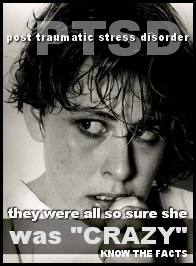
“Caregivers often experience stress, burnout or feel overwhelmed” is putting it mildly! Still as we talk about the strength, courage, commitment our veterans have, we need to also acknowledge what the families go through.
I am a veteran-veteran’s wife. Being married for 26 years to a Vietnam vet with PTSD was not easy for a very long time. While it is easier now that we have found what works for us, built our own kind of “normal” marriage, it grieves me greatly that there are so many younger wives out there giving up. Can you really blame them? After all, be honest here, because we really don’t give them what they need to stay.
Something as simple as waking up a PTSD husband in the middle of a nightmare can end up with a 9-11 call to police and a domestic violence arrest just because she didn’t understand where her husband was when he was being terrified by the nightmare. She didn’t know he was back in combat instead of in the bed next to her.
Not understanding what PTSD is, or TBI for that matter, has ended up with many marriages falling apart and a whole lot of grief to get over. It has also ended up with veterans being homeless.
 Then we have the wounded coming home after being burned, losing a limb, sight and hearing, along with bullet wounds. When they end up at a military hospital to recover, their families end up giving up jobs along with their paychecks, just to be with them to offer support while the veteran recovers. But we don’t talk about things like that. Hell, we don’t even talk about the wounded at all. The cable news “reporters” are too busy trying to support a class war in the never ending political season when they are not reporting on the latest celebrity scandal coming out, so they don’t even have time to report on an of the actions going on in Iraq or Afghanistan, so they would not be interested in covering something like the below for thousands of military families.
Then we have the wounded coming home after being burned, losing a limb, sight and hearing, along with bullet wounds. When they end up at a military hospital to recover, their families end up giving up jobs along with their paychecks, just to be with them to offer support while the veteran recovers. But we don’t talk about things like that. Hell, we don’t even talk about the wounded at all. The cable news “reporters” are too busy trying to support a class war in the never ending political season when they are not reporting on the latest celebrity scandal coming out, so they don’t even have time to report on an of the actions going on in Iraq or Afghanistan, so they would not be interested in covering something like the below for thousands of military families.
VA Celebrates National Family Caregiver Month
WASHINGTON (Nov. 8, 2010)- The Department of Veterans Affairs (VA) is
marking National Family Caregiver Month by honoring the service of
family members and friends who have dedicated their lives to caring for
chronically ill, injured, or disabled Veterans.“Caregivers are the family members and loved ones who take care of the
severely injured Veterans who need assistance on a daily basis,” said VA
Secretary Eric K. Shinseki. “These mothers, wives, fathers, husbands and
other loved ones make tremendous sacrifices to be there every day for
the Veterans who served this Nation. They are our partners in Veteran
health care and they deserve our support.”November is National Family Caregivers Month, and VA medical centers
nationwide will offer locally sponsored events for caregivers. Because
caregivers often experience stress, burnout, or feel overwhelmed by the
caregiving experience, planned activities will provide useful
information about VA and community resources that offer support and
assistance to caregivers and Veterans.Caregivers provide a valuable service to Veterans by assisting them
beyond the walls of VA medical facilities with support such as accessing
the health care system, providing emotional and physical support, and
allowing injured Veterans to stay in their homes rather than living
their lives in an institutional setting.Caregivers help Veterans maintain a better quality of life and gain more
independence. As the Veteran population ages and continues to increase,
the role of caregivers as partners in supporting Veterans is even more
prevalent. The Veteran population aged 65 and older is expected to
increase from 37.4 percent to 44.8 percent by the year 2020. VA is also
treating a new era of younger, severely injured Servicemembers. Many
Veterans from Iraq and Afghanistan will need lifetime care. VA
recognizes the support of their caregivers is vital for these Veterans.On May 5, 2010, President Obama signed into law the Caregivers and
Veterans Omnibus Health Services Act of 2010. Passed by Congress, this
law will allow VA to care for those who provide supplemental help to
family caregivers of the most severely wounded veterans returning from
Iraq and Afghanistan. VA has been consulting with Veterans
organizations, as well as individual Veterans and their family members,
to ensure these new programs are implemented to provide the best
possible support for those who have sacrificed so much.These benefits will add to the wide range of compassionate and practical
programs for Veteran caregivers that are already available from VA:o In-Home and Community Based Care: This includes skilled home
health care, homemaker home health aide services, community adult day
health care and home based primary care.o Respite care: Designed to temporarily relieve the family
caregiver from caring for a chronically ill, injured or disabled Veteran
at home, respite services can include in-home care, a short stay in a VA
community living center or other institutional setting or adult day
health care.o Caregiver education and training programs: VA provides
multiple training opportunities which include pre-discharge care
instruction and specialized caregiver programs such as polytrauma and
traumatic brain injury, spinal cord injury/disorders, and blind
rehabilitation. VA has a caregiver assistance healthy living center Web
page on My HealtheVet, www.myhealth.va.gov, as well as caregiver
information on the VA’s main Web page health site; both Websites include
information on VA and community resources and caregiver health and
wellness.o Family support services: These support services can be face to
face or on the telephone. They include family counseling, spiritual and
pastoral care. Polytrauma Centers also offer family leisure and
recreational activities and temporary lodging in Fisher Houses.o Other benefits: VA provides durable medical equipment and
prosthetic and sensory aides to improve function, financial assistance
with home modification to improve access and mobility, and
transportation assistance for some Veterans to and from medical
appointments.Caregivers should contact their nearest VA medical center for caregiver
activities in the local area. Facility locators and contact information
can be found at VA GOV
We can talk all about caring for our veterans but we really don’t considering how much more we should be doing but when we do not take care of their families, we do not support all they do to take care of the nation’s veterans, we end up not doing the best we can for any of them. In the long run, taking care of the families, educating them and supporting them, saves money for the greedy out there who feel that we spend too much money on them already. You cannot put a price tag on what the families do any more than you can put a price tag on what the veterans did for the sake of this nation. These programs from the VA are a great step in the right direction. We, the families, need all the support we can get. I get burned out all the time but God seems to have an endless supply of matches to start the fire in me up again, but I knew what PTSD was all along. I can’t imagine what it would have been like to know nothing about any of this. That is what it is like for families all across this country just looking for some support and information to do what they want to do to help instead of walking away. Support gives them the fuel to keep going instead of putting their marriage in a ditch and walking away.
ATTENTION READERS
We See The World From All Sides and Want YOU To Be Fully InformedIn fact, intentional disinformation is a disgraceful scourge in media today. So to assuage any possible errant incorrect information posted herein, we strongly encourage you to seek corroboration from other non-VT sources before forming an educated opinion.
About VT - Policies & Disclosures - Comment Policy



